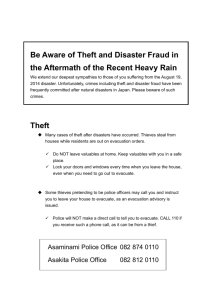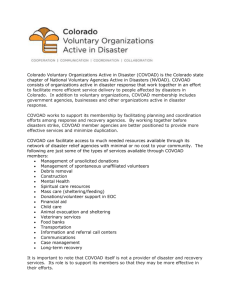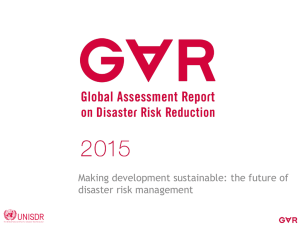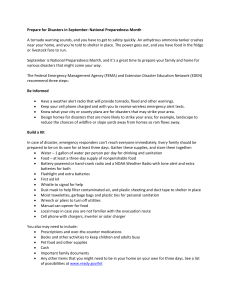Communiqué - Attorney-General`s Department
advertisement
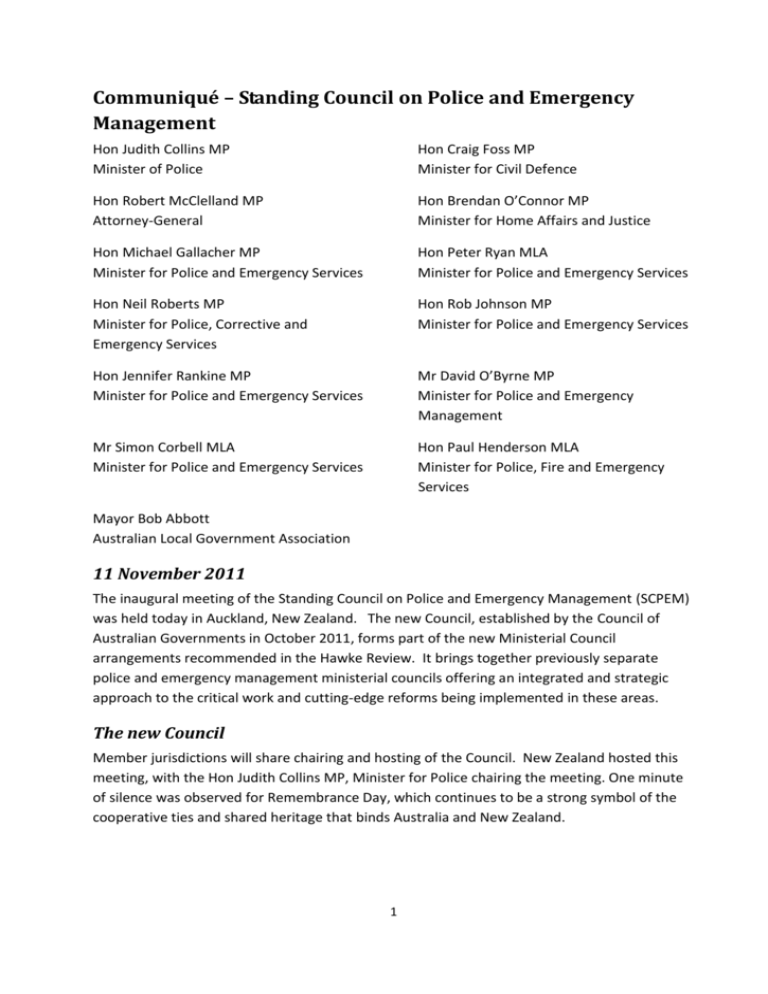
Communiqué – Standing Council on Police and Emergency Management Hon Judith Collins MP Minister of Police Hon Craig Foss MP Minister for Civil Defence Hon Robert McClelland MP Attorney-General Hon Brendan O’Connor MP Minister for Home Affairs and Justice Hon Michael Gallacher MP Minister for Police and Emergency Services Hon Peter Ryan MLA Minister for Police and Emergency Services Hon Neil Roberts MP Minister for Police, Corrective and Emergency Services Hon Rob Johnson MP Minister for Police and Emergency Services Hon Jennifer Rankine MP Minister for Police and Emergency Services Mr David O’Byrne MP Minister for Police and Emergency Management Mr Simon Corbell MLA Minister for Police and Emergency Services Hon Paul Henderson MLA Minister for Police, Fire and Emergency Services Mayor Bob Abbott Australian Local Government Association 11 November 2011 The inaugural meeting of the Standing Council on Police and Emergency Management (SCPEM) was held today in Auckland, New Zealand. The new Council, established by the Council of Australian Governments in October 2011, forms part of the new Ministerial Council arrangements recommended in the Hawke Review. It brings together previously separate police and emergency management ministerial councils offering an integrated and strategic approach to the critical work and cutting-edge reforms being implemented in these areas. The new Council Member jurisdictions will share chairing and hosting of the Council. New Zealand hosted this meeting, with the Hon Judith Collins MP, Minister for Police chairing the meeting. One minute of silence was observed for Remembrance Day, which continues to be a strong symbol of the cooperative ties and shared heritage that binds Australia and New Zealand. 1 Emergency Management With Australian and New Zealand communities still rebuilding after last summer’s devastating Canterbury earthquakes and Australian floods, cyclones and bushfires, the meeting provided a timely opportunity for Ministers to consider ongoing rebuilding and reconstruction work and examine disaster arrangements in preparation for the coming summer. SCPEM’s strategic priorities The Council focussed on the significant gains that have been made in building more disaster resilient governments, businesses, communities and households under the National Strategy for Disaster Resilience (the Strategy). The Strategy emphasises shared responsibility and a shift toward better planning and investment in disaster prevention, preparedness and mitigation The Council also agreed to jointly progress priorities of national significance including combating serious and organised crime, cybercrime, inter-jurisdictional cooperation in law enforcement and initiatives to address alcohol fuelled crime, public safety, child protection and related crimes. Learning from the past to plan for the future It is a Council priority to ensure that findings from significant commissions of inquiry into disaster events are taken into account in improving preparation, prevention and mitigation activities. Governments, businesses, non government organisations and the community can learn from these lessons to become better prepared for future disasters. Inquiries provide valuable lessons for informing national emergency management policy development, including the ongoing implementation of the Strategy. At the meeting, the Council considered the Review of recent Australian disaster inquiries, an independent study recently commissioned by the Commonwealth Government which considered common themes across a number of disaster inquires. Importantly, this examination of our past experience supports the decision to take a national resilience based approach now and into the future. Building Disaster Resilience Capability Following a successful flood technology forum in September 2011, Ministers agreed to continue to harness the latest scientific and technical expertise by conducting another forum in 2012. The theme for 2012 will be public warning and communication systems and situational awareness. Ministers also discussed several new initiatives that will provide an immediate boost to our ability to provide information to the public and connect them with each other quickly so that they are better prepared and informed as we head into the Australian disaster season: 2 A new Smartphone app will be ready by the end of the year which will provide users with mobile access to information about natural disasters to help them make better informed decisions about what to do and how to prepare. A national approach to improving State and Territory Triple Zero call services at times of high demand including: o improving interoperability of communications systems, o adoption of national phone numbers for State Emergency Services and Police Assistance, o all jurisdictions are continuing to partner in the further enhancement of the Emergency Alert system. Ministers agreed to look at ways to improve the integrity of static data relied on by the system, and o agreement on developing national standardised qualifications for Triple Zero call takers. The Commonwealth, States and Territories are working to provide public safety agencies with a nationally-interoperable mobile broadband capability. This will help first responders get better information about disasters earlier, so that lives and property can be protected. Effective communication is not only vital during a crisis but also across the whole prevention, preparedness, response and recovery spectrum. At today’s meeting, Ministers endorsed a National Disaster Resilience Communication Strategy, underpinned by six key resilience messages: o Disasters will happen – Natural disasters are inevitable, unpredictable and significantly impact communities and the economy. o Disaster resilience is your business – Governments, businesses, not-for-profit organisations, communities and individuals all have a role to play and to be prepared. o Connected communities are resilient communities- connected communities are ready to look after each other in times of crisis when immediate assistance may not be available. o Know your risk – Every Australian should know how to prepare for any natural disaster. o Get Ready – then act – reduce the effects of future disasters by knowing what to do. 3 o Learning from experience – we reduce the effects of future disasters by learning from past experiences. Knowing our risks Ministers noted that the Interim Report from the Queensland Flood Commission of Inquiry and the Review of recent Australian disaster inquires highlighted the importance of knowing our risks for different hazards and factoring this into our disaster preparation. Ministers agreed on the importance of being able to compare risk assessment and hazard mapping across jurisdictions by adopting the National Emergency Risk Assessment Guidelines. They also acknowledged some of the barriers faced to publishing this information and will take steps in the coming months to address these. This will support disaster resilient policy and planning by governments, town planners, developers, householders and the insurance industry. Ministers acknowledged the central role of the private sector in making sure essential goods and services continue to be provided or are restored quickly during natural disasters. Key industry sectors will be invited to participate in a national exercise to test our preparations for a major disaster scenario. This will see the start of a national exercise program for emergency management that will allow feedback on issues of national strategic interest to be provided to the National Emergency Management Committee. Continuing Support for disaster response and recovery Ministers endorsed a report of the Review of effectiveness of disaster relief and recovery payments and resolved to implement its recommendations. The Review examines payments and other assistance to individuals and communities affected by natural disasters with a view to better targeting and reducing possible disincentives to disaster resilience. To inform this process, Ministers committed to better data collection and analysis to evaluate the outcomes of assistance. Ministers acknowledged the indispensible role of emergency volunteers in disaster response and recovery and resolved to remove impediments to their attraction, support and retention. In particular, this will include identifying and addressing disincentives that may be operating within existing jurisdictional regulatory, training and accreditation frameworks. Policing National Organised Crime Response Plan Ministers noted the significant work of the Commonwealth, States and Territories under the National Organised Crime Response Plan 2011-13, which sets strategic principles and strategies to underpin a multi-jurisdictional approach to combating organised crime in Australia. Ministers today agreed to a range of priority measures under the National Response Plan, and 4 agreed to oversee implementation of measures that focus on policing and law enforcement issues and justice initiatives. National coordination of law enforcement cybercrime training and capabilities In 2010 the Australia New Zealand Policing Advisory Agency (ANZPAA), taking into account a recommendation from the National Cybercrime Working Group and discussion with the ANZPAA e-Crime Committee and the Electronic Evidence Specialist Advisory Group, agreed to progress the issue of national collaboration in the provision of training and acquisition of technical capabilities in the e-crime area. Ministers today noted the completion of training and education guidelines for the use of technology crime investigators and digital evidence practitioners as well as an online cybercrime conference and training calendar to ensure national awareness of law enforcement training and education. This is the first such time guidelines have been developed and will allow Commonwealth, State and Territory law enforcement agencies to better coordinate their activities to address cyber crime. Emerging Drug Issues Ministers resolved that the proliferation of synthetic cannabinoids and analogue drugs is an emerging issue that should be considered at a national level, noting concerns about the marketing of Synthetic cannabinoids as a legal high. Ministers agreed that the Commonwealth Attorney-General’s Department will work with other jurisdictions to examine in detail options for a nationally consistent response to synthetic cannabinoids and report to the Ministers when they meet again in 2012. National Scheme for the Mutual Recognition of DVOs and Information Sharing Capability Ministers expressed in principle support for the automatic mutual recognition of DVOs and the benefits a scheme will bring in ensuring protection to aggrieved persons and their children throughout Australia. Ministers also agreed that the Commonwealth will establish and lead a National Police Reference System Working Group, with representatives from Australian State and Territory police services and relevant courts and justice personnel, to consider in detail, the information sharing issues and associated costs that attend this proposal, and report back to SCPEM by the next meeting to ensure mutual recognition of DVOs is facilitated as quickly as possible. 5
